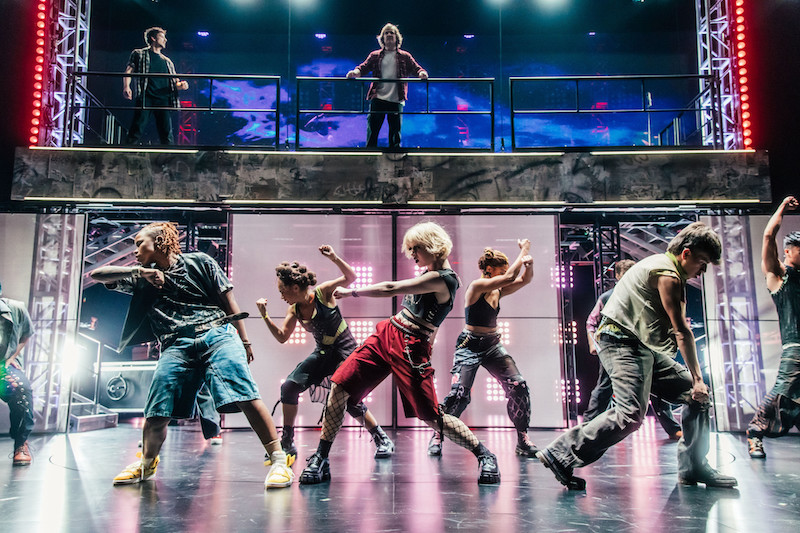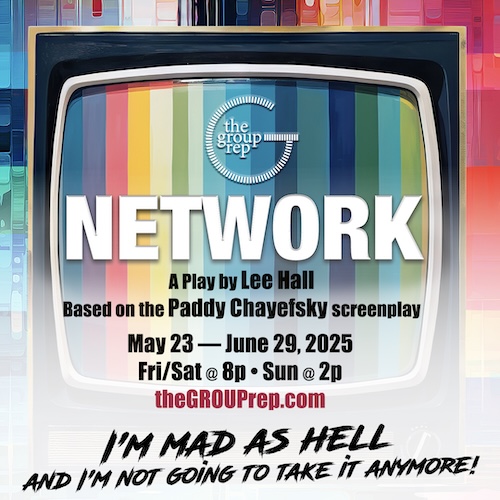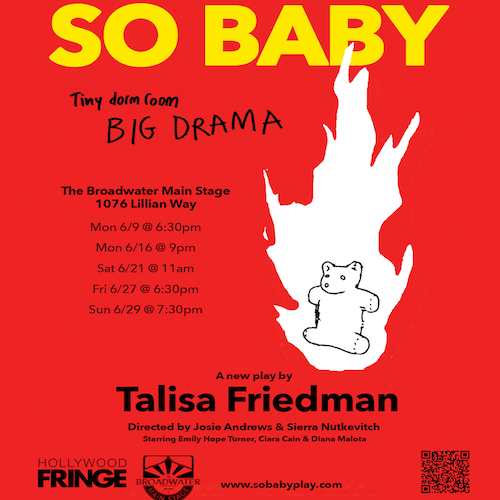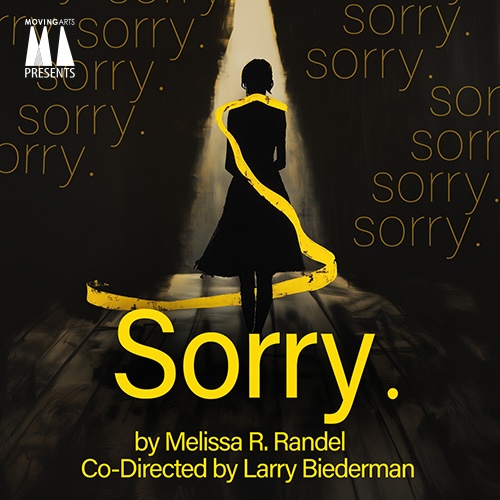
The ensemble of American Idiot (Photo by Jeff Lorch)
Reviewed by Katie Buenneke
The Mark Taper Forum
Through November 16
Probably the first pop-punk opera, American Idiot has never been an easy show to stage. Director Snehal Desai has taken on the task in his inaugural season programming for CTG as artistic director, and he sometimes succeeds, but isn’t able to avoid all the show’s pitfalls.
This production, which is a joint effort from CTG and Deaf West Theatre, follows three young men, all played by deaf actors, and voiced by hearing actors: Johnny, played Daniel Durant, and voiced by Milo Manheim; Will, played by Otis Jones IV, and voiced by James Olivas; and Tunny, played by Landen Gonzales, and voiced by Brady Fritz. They feel they’re wasting away in suburbia, and make plans to go to the city, but Will is waylaid when his girlfriend, Heather (Ali Fumiko Whitney) informs him she’s pregnant. He stays behind, while Johnny and Tunny go on as planned. There, Johnny finds drugs, embodied by St. Jimmy (Mason Alexander Park), and a girl (Mars Storm Rucker), in that order. Tunny sees a recruitment ad for the military, decides to join, and is soon deployed to the Middle East, where he’s injured, and then falls in love with his nurse, played by Kaia T. Fitzgerald and voiced by Jerusha Cavazos. Each boy goes on a journey, whether near or far from their hometown, but they reunite again at the 7/11 where they all used to hang out, grown and changed.
If it feels like I over-explained above, I did so with intention, because it’s a show I’ve seen probably half a dozen times, but one which leaves most first-time viewers asking, “what was the plot of that show?” It’s a show I love, but I’m well aware that it’s a difficult show to stage well.
American Idiot, the Green Day album that serves as the source material for this show, came out in September 2004, three years after 9/11, three years into the war in Afghanistan and one year into the war in Iraq, right before George W. Bush was re-elected, when reality TV was culture’s gaudy king — the first season of The Apprentice aired earlier that year. When it became a musical in 2009-10, we were in the Obama era of “Hope,” but still entrenched in seemingly endless wars in Iraq and Afghanistan. Now, we’re in our third election cycle with Donald Trump as the Republican nominee, even though he encouraged his followers to attempt a coup while he was president, our presence in Iraq and Afghanistan is officially over, but war in the Middle East looms larger than ever, there’s a fentanyl epidemic, Y2K fashion is back, and young men, especially a swath of young White men who never graduated from college, seem alarmingly disconnected from polite society. So the time should be ripe for a revival of American Idiot, a musical that has something to say about the ways in which American idiocy has — and hasn’t — changed in the past 20 years.
But aside from the lackluster inclusion of FaceTime, the costuming (by Lena Sands) and a few nods to Trump in the pre-show media montage, there’s little about Desai’s staging that makes it feel specific to 2024, which seems like a real missed opportunity.
The show is inherently overwhelming, more so in this staging, as most of the characters appear twice onstage, with their main actors and the performers playing their voices and shadows. Unfortunately, Desai mostly fails or, or perhaps intentionally declines to direct the audience’s focus. The Voices (actors who speak for the deaf performers) are inconsistently lit; Milo Manheim, who along with his counterpart Daniel Durant, is one of the most objectively famous actors in the show (he was in the Disney Channel Zombies movies and was on Dancing with the Stars) is almost always illuminated when he’s onstage, but he’ll often be next to Will and Tunny’s voices, and those two will be unlit, even though all three are singing, which ends up feeling more like a commentary on Manheim’s fame rather than a dramaturgical choice.
Takeshi Kata’s set is two and a half levels, all of which Desai employs regularly, but does the audience no favors in trying to follow the story. Sometimes, the actors will be on the ground, with their voices on a catwalk above, drawing attention when our focus should be on the actors. Or all the leads might be on the top, but there’s a huge, flowing and jumping ensemble doing Jennifer Weber’s choreography on the bottom. In between the two main levels are David Murakami’s projections, which include the most stunning open captioning I’ve ever seen, effectively capturing musicality in writing. They are so beautiful and artful on a busy stage that they serve as yet another distraction from where it seems our attention should be, to follow the already-hazy narrative.
Timing is key in any show, particularly in any musical, especially in one that’s almost entirely sung-through, and is of the utmost importance when many of the musical’s cast are deaf or hard of hearing. Unfortunately, on opening night, the show felt under-rehearsed, with a few timing and pitch flubs. One of the show’s greatest assets is Tom Kitt’s orchestrations, and the band, under David O’s music direction, mostly kills it, aside from the drummer who was half a beat to a beat behind for much of the show. This would be annoying in any production, but is a critical issue in a show with as many deaf cast as this one, as they are guided by the vibrations from the band.
There are many stunning moments in the show: when Johnny’s Voice walks away from him during “Boulevard of Broken Dreams,” reuniting with him on the lyric “My shadow’s the only one that walks beside me”; whenever Lark Detweiler and Angel Theory have featured moments to dance; when Will begs for numbness during “Give Me Novocaine” and his voice literally oozes down the sofa; the way “Are We the Waiting,” a song sung as a round, gets transcribed lyrically in the open captions. They’re innovative images that are only possible because of the new depth the text gains with a deaf cast, divorcing the characters from their Voices, creating necessary shadow selves in a show about isolation. But those moments of care and beauty are too few and far between.
Center Theatre Group and Deaf West Theatre at The Mark Taper Forum, 135 North Grand Ave., downtown, Tues.-Fri., 8 pm; Sat., 2:30 & 8pm.; Sun., 1 & 6:30 pm; thru Nov. 16. https://CenterTheatreGroup.org. Running time: 90 minutes with no intermission.


















